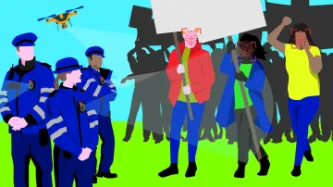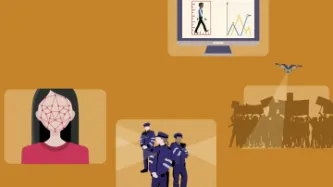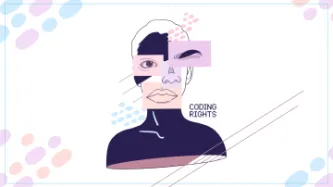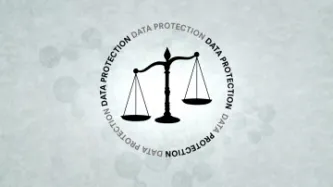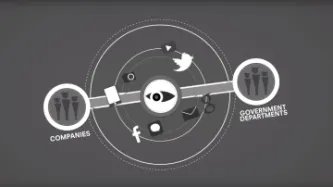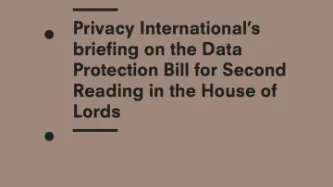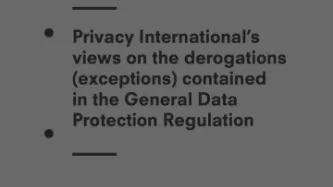Advanced Search
Content Type: Advocacy
As part of our campaign 'The End of Privacy in Public' and our wider work monitoring developments of facial recognition technology (FRT) in the UK, we continue to to challenge the government, the police and the private sector regarding their unfettered roll out of FRT in the UK.To this end, we co-signed a letter sent on 4 June 2024, alongside UK civil society organisations campaigning against the use of facial recognition, to retailers across the UK calling on them to not use live FRT within…
Content Type: Advocacy
As part of our campaign 'The End of Privacy in Public' and our wider work monitoring developments of facial recognition technology (FRT) in the UK, we continue to to challenge the government, the police and the private sector regarding their unfettered roll out of FRT in the UK. In May 2024, we co-signed a letter with a coalition of UK based NGOs regarding a recent investigation that exposed The Metropolitan Police's (the Met) use of website PimEyes. PimEyes acts as a facial recognition ‘…
Content Type: Long Read
IntroductionFor years PI has been exposing and advocating against the use of facial recognition technology (FRT) and the grave threats it poses to our rights. This highly invasive technology is paving the way to a dystopian, biometric surveillance state, where everyone is identified and tracked everywhere they go, in real time, as they move through public spaces during their everyday lives. Furthermore, this is taking place within a democratic vacuum, without any specific legislation pertaining…
Content Type: Advocacy
Privacy International (PI), Big Brother Watch (BBW), StopWatch, CopWatch, Defend Digital Me, Liberty and Statewatch have written to Home Secretary James Cleverly to raise concerns over the danger posed to UK society by Facial Recognition Technology (FRT).In a letter sent on 18 January 2024, the signatories raised concerns over the escalating use of FRT and warned the Home Secretary that "The indiscriminate use of this dystopian biometric technology to identify people in public spaces is a form…
Content Type: Press release
9 November 2023 - Privacy International (PI) has just published new research into UK Members of Parliament’s (startling lack of) knowledge on the use of Facial Recognition Technology (FRT) in public spaces, even within their own constituencies. Read the research published here in full: "MPs Asleep at the Wheel as Facial Recognition Technology Spells The End of Privacy in Public".PI has recently conducted a survey of 114 UK MPs through YouGov. Published this morning, the results are seriously…
Content Type: Long Read
TAKE ACTION TO STOP THE END OF PRIVACY IN PUBLIC1. IntroductionThe use of facial recognition technology (FRT) by law enforcement and private companies in public spaces throughout the UK is on the rise. In August 2023, the government announced that it is looking to expand its use of FRT, which it considers “an increasingly important capability for law enforcement and the Home Office”. The indiscriminate use of this dystopian biometric technology to identify individuals in public spaces is a form…
Content Type: Examples
In a legal action, the Independent Workers Union of Great Britain and the App Drivers and Couriers Union claim that Uber's use of facial recognition software for its Real-Time ID Check to verify the identity of drivers is discriminatory because facial recognition software is known to be less accurate at identifying people with darker skin. The action was brought on behalf of two drivers whose accounts were terminated following errors made by the Microsoft-supposed facial recognition software.…
Content Type: Report
PI has been fighting against police using intrusive & disproportionate surveillance technologies at protests around the world for years. Unregulated surveillance and indiscriminate intrusions on our privacy have a chilling effect on the right to freedom of assembly.
We've fought to uncover the types of technologies that police secretly deploy at protests, and we have detailed how protesters around the world can try to protect their intimate and sensitive data from being captured by the…
Content Type: Advocacy
PI, together with 30 national and international civil society organisations (CSOs), release an open letter calling on Parliament and relevant stakeholders to halt and ban the use of live facial recognition technology (LFRT) by the police and private companies.We believe that the use of LFRT poses significant and unmitigable risks to our society. We do not believe that it can ever be safely deployed in public spaces or for mass surveillance purposes.The open letter comes as a result of a recent…
Content Type: News & Analysis
Our relationship with ‘public space’ is being redefined, not just by a global pandemic, but also by a new era of biometric surveillance technologies. Biometric mass surveillance enables companies and authorities to track us based on unique personal data and identify us whenever, wherever we go.The increasing use of facial recognition and other biometric surveillance technologies – on our streets, in train stations, at protests, at sports matches and even in our global ‘town square’, Facebook –…
Content Type: Long Read
This is based on UK data protection legislation. The UK’s General Data Protection Regulation (UK GDPR) does not apply to processing of personal data for law enforcement purposes by relevant authorities.
What can happen to my personal data at a peaceful protest?
The most common personal data processed at a protest are notes and photographs taken by police officers, along with voice and video recordings taken from body-worn cameras or drones.
Data processing can also happen with…
Content Type: News & Analysis
Imagine going to a peaceful protest and having to show your ID to the police before you can join it. Or having to fill out a form about why you are attending that particular protest.Sounds absurd, right? Surely we should all be free to protest, without the police knowing who we are?But high tech surveillance of protests is real, and it enables the police to identify, monitor and track protestors, indiscriminately and at scale.For example, your face is increasingly becoming your ID card with the…
Content Type: Explainer
What is Facial Recognition Technology?Facial recognition technology (FRT) collects and processes data about people’s faces, and can be used to identify people. FRT matches captured images with images stored in existing databases or ‘watchlists’.How might it be used in relation to a protest?FRT may be used to monitor, track and identify people’s faces in public spaces, including at protests. This may be done openly or surreptitiously, without people knowing or consenting.FRT-enabled cameras can…
Content Type: News & Analysis
This blog post by Coding Rights was originally published in Portuguese at: https://tinyurl.com/mediumcodingrightsTransID. It was written by Mariah Rafaela Silva and Joana Varon and translated by Erly Guedes. Illustration was produced by Clarote.On the International Transgender Day of Visibility, Mariah Rafaela Silva and Joana Varon authors of the report “Facial recognition in the public sector and trans identities: techno-politics of control, surveillance and threats to gender diversity…
Content Type: Call to Action
Email your MP using any or all of the points below to start your message
You must personalise your message, for example to say why you feel passionate about this issue or what aspects particularly concern you.
Make sure you put: "Urgent: Data Protection Bill - Amendments for Report State on 9 May" in the subject title
Use the ‘Contact’ box above to send your email
Points to raise in your letter
RE: Data Protection Bill - Amendments for Report State on 9 May…
Content Type: News & Analysis
This post was written by Chair Emeritus of PI’s Board of Trustees, Anna Fielder.
The UK Data Protection Bill is currently making its way through the genteel debates of the House of Lords. We at Privacy International welcome its stated intent to provide a holistic regime for the protection of personal information and to set the “gold standard on data protection”. To make that promise a reality, one of the commitments in this government’s ‘statement of intent’ was to enhance…
Content Type: News & Analysis
This piece was written by PI Legal Office Millie Graham Wood.
“The UK is leading the way on modern data protection laws and we have worked closely with our EU partners to develop world leading data protection standards”[1] according to, Matt Hancock MP, Minister of State for Digital. However, the proposals in the UK Data Protection Bill continue and expand a highly secretive system which allows processing of personal data to be exempt from key safeguards and fundamental protections on…
Content Type: Advocacy
Privacy International welcomes the aim of this Bill (Data Protection Bill), “to create a clear and coherent data protection regime”, and to update the UK data protection law, including by bringing the EU General Data Protection Regulation (GDPR) and the Data Protection Law Enforcement Directive (DPLED) - into the UK domestic system. This is Privacy International’s briefing on the Data Protection Bill for second reading in the House of Lords
Content Type: Advocacy
Privacy International welcomes the willingness of the UK government to implement the EU General Data Protection Regulation (GDPR), which provides stronger standards of protection of personal data to those contained in the EU Directive 1995, whose provisions were implemented in the Data Protection Act 1998. Improved rights and enforcement measures will generate greater trust and therefore greater engagement in the digital environment, which will in turn benefit the economy. …






